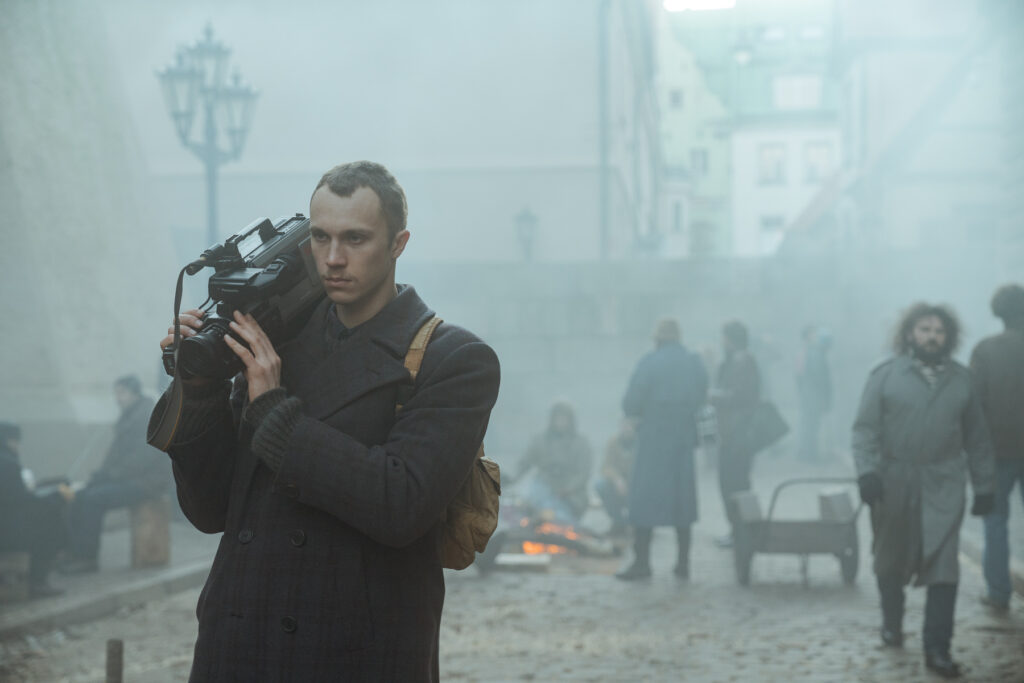July 10, 2022
by Carla Hay

Directed by Stephan Rick
Some language in Latvian with subtitles
Culture Representation: Taking place in Latvia, the dramatic film “The Good Neighbor” features an all-white cast of characters representing the working-class and middle-class.
Culture Clash: An American news journalist, who has recently moved from New York City to Latvia for a new job, is the driver in a hit-and-run accident that kills a woman, and he covers up the crime with his mysterious and obsessive neighbor, who was in the car with him.
Culture Audience: “The Good Neighbor” will appeal primarily to people who don’t mind watching tedious crime dramas with plot holes and predictable story arcs.

“The Good Neighbor” should really be titled “The Evil Neighbor Who Manipulates a Lousy Journalist to Make Stupid Decisions in Covering Up a Horrible Crime.” That’s the movie’s entire plot, in case people don’t want to waste time watching this junk. But if you want to subject yourself to a boring and formulaic crime drama, then brace yourself for the mind-numbing banality of “The Good Neighbor,” where the so-called surprises can easily be predicted long before they’re revealed. Meanwhile, the movie leaves many questions unanswered by the end.
Written and directed by Stephan Rick (with screenwriting credits also going to Silja Clemens and Ross Partridge), “The Good Neighbor” has a huge, glaring plot hole that’s so big, it sinks the movie like a crater of quicksand. The movie’s protagonist is David Stevens (played by Luke Kleintank), an American journalist who has recently moved from New York City to Latvia to start a new job and to start a new life after getting his heart broken by an ex-girlfriend.
David isn’t just any journalist. He’s an investigative news journalist. Think about that when you see David make all sorts of idiotic mistakes that no self-respecting news journalist would make. When he commits a hit-and-run crime, he also acts like he’s the only journalist who could possibly investigate this crime. “The Good Neighbor” is a pile-on of illogical tripe.
One of the biggest mistakes that David makes is that he doesn’t bother to do a background check on the creepy neighbor who has a shady past and who tells David to commit crimes or cover up crimes with him, beginning with a hit-and-run accident that kills someone. David gets glaring clues that this neighbor cannot be trusted, but he doesn’t investigate when these clues are literally staring him in the face. It’s just one of many problems with the movie’s flimsy screenplay.
Because “The Good Neighbor” filmmakers have made David a journalist, it just makes him less sympathetic in how he lets himself be overly manipulated by someone he doesn’t bother to investigate. David should know better than the average person who’s not a journalist how to do a background check. However, he doesn’t use logic or his journalist resources to get himself out of his predicament.
David’s troubles start shortly after he moves to Riga, Latvia, where he’s been offered a job as a writer/reporter for the European Press Network, which does a lot of breaking news online. The European Press Network covers news on the local, national and international levels. David has been assigned coverage of mostly local news, even though he doesn’t speak Latvian, and this is the first time that David has lived in Latvia.
David’s boss is also American. His name is Grant (played by Bruce Davison), and he is letting David stay at a rental house owned by Grant. This house is in (cliché alert) a fairly isolated, wooded area. Grant is generous enough to let David use Grant’s spare car while David is living on the property. Guess which car is going to be the one involved in David’s hit-and-run accident?
After Grant gives David a tour of the house, he comments to David about David’s new job at the European Press Network: “I know it’s a step down for you now, but we’ll get you into the system, and we’ll go from there.” Why has David moved to another country where he doesn’t know the national language and where he’s willing to take a job that’s a “step down” for him? (The movie never bothers to say what journalist job David had before moving to Latvia.)
David reveals later in a conversation with his clingy neighbor that he’s starting over in Latvia because his girlfriend broke up with him because David wasn’t ready to get married. And then the ex-girlfriend began an affair with David’s best friend. David makes this personal revelation when the neighbor comes over and offers to help David fix Grant’s car, which has trouble starting.
The guy who will turn out to be the not-so-good neighbor in “The Good Neighbor” is named Robert (played by Jonathan Rhys Myers), a British weirdo who lives alone and who works part-time as a visiting home caregiver. Even though David is in Latvia, he keeps meeting people who are American or British. (Rhys Meyers is actually Irish, but he plays a lot of British characters.) In other words, the stars of the movie are American or Western European, but it was cheaper for the filmmakers to make the movie in Latvia.
The first time that David meets Robert, it’s when David is driving Grant’s car near the rental house, the car runs out of gas, and he walks to the nearest house to ask for help. Robert is the resident of the house. And he conveniently has some extra automobile gas, which Robert generously gives to David. During their conversation, David finds out that Robert is his closest neighbor.
The next time that David sees Robert, it’s when David is having trouble starting Grant’s clunker car. And suddenly, Robert is in the garage (like a stalker) and offering to help fix the car, which Robert does. David doesn’t seem to notice the red flag of Robert being in his garage unannounced and uninvited. Maybe he’s just happy to meet a seemingly friendly neighbor who is also a bachelor who can speak English.
And you know what that means: Robert and David end up hanging out together at a nightclub, at Robert’s invitation. They take Grant’s car, and David is the one who does the driving. During this night out together, David meets and flirts with a 28-year-old British woman named Janine Rafaela (played by Ieva Florence), who says she’s originally from London, but she’s currently living in Riga for some “soul searching.”
After some drinking and flirty dancing together, David and Janine sense the chemistry they have together, so they exchange phone numbers. To make sure that Janine didn’t give him a fake number, David calls her phone number to see for himself that the phone that she has in her hand will ring. And it does.
Janine says she has to leave because she has to get up early for work. David thinks he’s possibly found his next girlfriend, so he doesn’t really want to stay at the nightclub any more either. David tells Robert (who has been quietly watching David and Janine from afar, with a hint of jealousy) that he’s ready to leave.
On the drive back home on a fairly deserted road, David excitedly talks to Robert about Janine and how he’s looking forward to seeing her again. But the way that David sees Janine again is entirely tragic. During this conversation in the car, Robert offers David a cigarette, and David momentarily takes his eyes off of the road to take the cigarette. Someone on a bicycle suddenly appears in front of the car. It’s too late for David to swerve, and he hits the bicyclist with the car.
A panicked David stops the car and gets out to see if the person he hit is okay. David and Robert are both shocked to see that the bleeding person on the road is Janine. And she’s unconscious or dead. Because Robert has medical training as a nurse, he examines Janine and tells David that she’s definitely dead. David wails in agony, and his first thought is to call for help.
However, Robert firmly tells David that David will be arrested because David had been drinking enough alcohol to be over the legal limit. “This is murder,” Robert hisses at David. Robert can’t claim to be the driver because Robert was also drinking alcohol. Adding to the panic, Robert warns David that he doesn’t want to end up in a Latvian prison. And so, David allows Robert to convince David that the best thing to do is to leave Janine on the road, go home, and pretend to everyone that they don’t know anything about what just happened.
And what about the car, which has a broken front window and other damage at the front of the car? David hides it in the garage and decides he’s going to figure out later what to do about the car. But when David is at work, Robert steals the car without David’s knowledge, removes the car’s license plates, and drives it into a lake. (This isn’t spoiler information, because it’s in the movie’s trailer.)
David is furious when he finds out what Robert did, but Robert assures him that it was necessary to get rid of this evidence. Later, when Grant comes for a visit and notices that the car is missing, David tells Grant that the car was stolen. Grant is the legal owner of the car, so Grant is the one who reports to the police that the car has been stolen. David rents a car while Grant’s car remains missing.
Robert comes up with a plan for Robert and David to claim that they were on a train at the time the hit-and-run accident happened. It’s a weak alibi because David and Robert can’t prove they were on the train when they said they were. Because David and Robert are each other’s alibis and know what happened, Robert convinces David that if one of them gets in trouble for the crime, so will the other one.
However, since David was the driver, Robert reminds David that David will get the worse punishment. Robert convinces David that David needs Robert to protect this secret. Robert repeatedly tells David to trust Robert because Robert doesn’t want to get arrested either. But is Robert really helping or hurting their chances of getting away with this crime? “The Good Neighbor” would not exist if Robert was helping.
Janine’s body is found, and investigators quickly determine that she was hit by a car. The hit-and-run case makes the news, of course. And what a coincidence: David is assigned to cover the case for his job, making it easier for him to find out what investigators know. But it also makes his guilt go into overdrive, which leads him to make more foolish decisions.
David find out that a witness has come forward after the media coverage of the hit and run. This witness claims to have seen two men talking near the crime scene around the time of the hit and run. This witness will soon be doing a formal interview with investigators. The lead investigator is a no-nonsense detective named Juta Reine (played by Guna Zarina), who is determined to get justice for Janine.
And here’s another coincidence: When David tells Robert the name of the witness, it’s how Robert finds out that the witness happens to be his elderly home care patient Madam Petrova (played by Regina Razuma), who says she was too far away to get a good look at the men, but she can give a general description of the men. Needless to say, Madam Petrova’s fate can easily be predicted as soon as Robert knows that she’s a witness.
David attends a press conference giving an update on the hit-and-run case. Immediately after the press conference, a woman in attendance approaches David and begs him to tell her what he knows about the investigation. She introduces herself as Janine’s younger sister Vanessa (played by Eloise Smyth), a graphic designer who has traveled from England because of this tragedy.
David is in shock that he has just met Janine’s sister, but he masks his feelings by being a little cold and detached with Vanessa and telling her he can’t do much to help. David suggests to Vanessa that she continue get any updates from the investigators. Vanessa desperately pleads with David to at least put in his article a request for any witnesses to come forward. David agrees that he will do that, but it won’t be a guarantee that it will help.
Vanessa then shows up unannounced at David’s office to ask for his help again. She mentions that her parents are dead, and Janine was her last living relative. However, Janine and Vanessa were estranged at the time of Janine’s death, so Vanessa feels guilty that they weren’t able to reconcile before Janine unexpectedly died.
David is unnerved by Vanessa being Janine’s sister, but there’s an obvious attraction between David and Vanessa. In a violation of journalistic ethics, David begins dating Vanessa, even though journalists covering a crime aren’t supposed to get romantically involved with people who are directly affected by the crime or who are involved with the investigation. (David and Vanessa’s romance isn’t spoiler information, since it’s in the movie’s trailer.)
But even if David and Vanessa didn’t get romantically involved with each other, any journalistic ethics he might have had went out the window when David took the assignment to report on the investigation of the hit-and-run death that he caused. And when Robert finds out about David and Vanessa getting romantically involved with each other, you don’t have to be a moronic journalist in a bad movie to know how Robert will react.
In the role of Robert, Rhys Meyers gives a performance that alternates between campy and tedious. The movie’s other cast members don’t do anything remarkable or memorable in their roles. They all look like they’re just going through the motions because they know “The Good Neighbor” is not a good movie.
There’s a point in the movie where David, who becomes increasingly mistrustful of Robert, asks Grant what he knows about Robert. Grant tells David that Robert’s single mother was an airline stewardess who used to leave Robert alone for weeks at a time when Robert was a child. Grant also describes Robert as an “odd bird.” It’s also briefly mentioned that Robert’s mother died mysteriously. But does David do anything with this information to find out more about Robert? No.
And so, viewers see that not only is David a hit-and-run killer, a deceitful lover and an unethical journalist, but he’s also an incompetent journalist. And viewers are supposed to be rooting for this guy? Apparently so, because “The Good Neighbor” filmmakers want to make David’s relationship with Vanessa look like a reason why David should be worthy of redemption, while spiteful Robert gets jealous and tries to ruin this romance.
There’s an unspoken homoerotic subtext to Robert’s growing obsession with David. One day, Robert and David are fishing together on a small boat when David accidentally gets a cut on a finger. It’s a minor cut, but Robert grabs David’s hand and starts sucking on the finger, as if David needs poison sucked out of his blood, or as if Robert wants to drink David’s blood like a vampire.
David is understandably disturbed by this blood-sucking from Robert. He yells at Robert, who makes an apology for overreacting to this minor cut. David makes a half-hearted attempt to distance himself from Robert, who begins secretly stalking David and Vanessa, whether David and Vanessa are apart or together. On one occasion, Robert vandalizes David’s rental car that’s parked outside a restaurant while David and Vanessa are inside the restaurant on a dinner date.
How far will Robert go? And will Vanessa find out the truth about David? Will anyone be punished for the hit-and-run killing? The last 20 minutes of “The Good Neighbor” try to cram in some plot twists that don’t ring true at all. By the time the end of the movie happens (if any viewers are still awake), not many people will care what happens to David and Robert, who are their own worst enemies.
Screen Media Films released “The Good Neighbor” in select U.S. cinemas, on digital and VOD on June 17, 2022.


